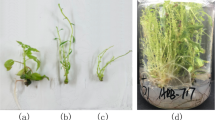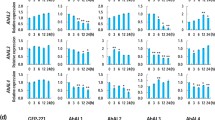Abstract
Recent environmental issues have increased the demand for woody biomass as a renewable resource for industry and energy. For a stable supply of woody biomass, it is critical to decrease the effects of abiotic stresses, such as drought and salinity, which hinder plant growth. For the goal to develop practical stress-tolerant trees, we generated transgenic poplar plants (P. tremula × tremuloides), in which a key Arabidopsis regulatory factor involved in stress responses, SNF1-related protein kinase 2C (AtSRK2C), or galactinol synthase 2 (AtGolS2), was overexpressed. Both types of transgenic poplar plants displayed higher tolerance to abiotic stresses, in comparison with nontransgenic plants, indicating that AtSRK2C and AtGolS2 can function in the abiotic stress response pathway of poplar. We also examined the expression profiles of ten poplar genes putatively homologous to well-known Arabidopsis stress response genes and found that several of the poplar genes showed different responses to abiotic stress from their Arabidopsis counterparts. Whereas the overexpression of AtSRK2C in transgenic Arabidopsis plants was reported to upregulate the expression of endogenous genes, the overexpression of AtSRK2C or AtGolS2 in transgenic poplar did not. Taken together, our findings suggest that the details of the underlying molecular mechanisms of the abiotic stress response may differ, but that the key regulatory factors in Arabidopsis and poplar have common features and are effective molecular targets for further breeding to enhance abiotic stress tolerance in poplar.




Similar content being viewed by others
Abbreviations
- ABA:
-
Abscisic acid
- DREB:
-
Dehydration-responsive element binding
- GC-MS:
-
Gas chromatography-mass spectrophotometry
- GolS:
-
Galactinol synthase 2
- LEA:
-
Late embryogenesis abundant
- RFO:
-
Raffinose family oligosaccharide
- RT-PCR:
-
Reverse transcription polymerase chain reaction
- SRK2C:
-
SNF1-related protein kinase 2C
References
Allen JA, Chambers JL, Stine M (1994) Prospects for increasing the salt tolerance of forest trees: a review. Tree Physiol 14:843–853
Black M, Corbineau F, Gee H, Côme D (1999) Water content, raffinose, and dehydrins in the induction of desiccation tolerance in immature wheat embryos. Plant Physiol 120:463–472
Bouchabke O, Chang F, Simon M, Voisin R, Pelletier G, Durand-Tardif M (2008) Natural variation in Arabidopsis thaliana as a tool for highlighting differential drought responses. PLoS One 3:e1705
Boudsocq M, Barbier-Brygoo H, Laurière C (2004) Identification of nine sucrose nonfermenting 1-related protein kinases 2 activated by hyperosmotic and saline stresses in Arabidopsis thaliana. J Biol Chem 279:41756–41766
Brosché M, Vinocur B, Alatalo ER, Lamminmäki A, Teichmann T, Ottow EA, Djilianov D, Afif D, Bogeat-Triboulot MB, Altman A, Polle A, Dreyer E, Rudd S, Paulin L, Auvinen P, Kangasjärvi J (2005) Gene expression and metabolite profiling of Populus euphratica growing in the Negev desert. Genome Biol 6:R101
Chae K, Gonong BJ, Kim SC, Kieslich CA, Morikis D, Balasubramanian S, Lord EM (2010) A multifaceted study of stigma/style cysteine-rich adhesin (SCA)-like Arabidopsis lipid transfer proteins (LTPs) suggests diversified roles for these LTPs in plant growth and reproduction. J Exp Bot 61:4277–4290
Chen J, Xia X, Yin W (2009) Expression profiling and functional characterization of a DREB2-type gene from Populus euphratica. Biochem Biophys Res Commun 378:483–487
Chen S, Polle A (2010) Salinity tolerance of Populus. Plant Biol 12:317–333
Choi H, Hong J, Ha J, Kang J, Kim SY (2000) ABFs, a family of ABA-responsive element binding factors. J Biol Chem 275:1723–1730
Cox SE, Stushnoff C (2001) Temperature-related shifts in soluble carbohydrate content during dormancy and cold acclimation in Populus tremuloides. Can J Fores Res 31:730–737
Cutler SR, Rodriguez PL, Finkelstein RR, Abrams SR (2010) Abscisic acid: emergence of a core signaling network. Annu Rev Plant Biol 61:651–679
Ding M, Hou P, Shen X, Wang M, Deng S, Sun J, Xiao F, Wang R, Zhou X, Lu C, Zhang D, Zheng X, Hu X, Chen S (2010) Salt-induced expression of genes related to Na(+)/K(+) and ROS homeostasis in leaves of salt-resistant and salt-sensitive poplar species. Plant Mol Biol 73:251–269
dos Santos TB, Budzinski IG, Marur CJ, Petkowicz CL, Pereira LF, Vieira LG (2011) Expression of three galactinol synthase isoforms in Coffea arabica L. and accumulation of raffinose and stachyose in response to abiotic stresses. Plant Physiol Biochem 49:441–448
Eriksson ME, Israelsson M, Olsson O, Moritz T (2000) Increased gibberellin biosynthesis in transgenic trees promotes growth, biomass production and xylem fiber length. Nat Biotechnol 18:784–788
Fujita Y, Fujita M, Satoh R, Maruyama K, Parvez MM, Seki M, Hiratsu K, Ohme-Takagi M, Shinozaki K, Yanaguchi-Shinozaki K (2005) AREB1 is a transcription activator of novel ABRE-dependent ABA signaling that enhances drought stress tolerance in Arabidopsis. Plant Cell 17:3470–3488
Hu L, Lu H, Liu QL, Chen XM, Jiang XN (2005) Overexpression of mtlD gene in transgenic Populus tomentosa improves salt tolerance through accumulation of mannitol. Tree Physiol 25:1273–1281
Jansson S, Douglas CJ (2007) Populus: a model system for plant biology. Annu Rev Plant Biol 58:435–458
Janz D, Behnke K, Schnitzler JP, Kanawati B, Schmitt-Kopplin P, Polle A (2010) Pathway analysis of the transcriptome and metabolome of salt sensitive and tolerant poplar species reveals evolutionary adaption of stress tolerance mechanisms. BMC Plant Biol 10:150–167
Kempa S, Krasensky J, Santo SD, Kopka J, Jonak C (2008) A central role of abscisic acid in stress- regulates carbohydrate metabolism. PLoS One 3:e3935
Kikuchi A, Kawaoka A, Shimazaki T, Yu X, Ebinuma H, Watanabe KN (2006) Trait stability and environmental biosafety assessments on three transgenic Eucalyptus lines (Eucalyptus camaldulensis Dehnh. codA 12–5B, codA 12–5C, codA 20-C) conferring salt tolerance. Breeding Res 8:17–26 (in Japanese)
Kubo M, Udagawa M, Nishikubo N, Horiguchi G, Yamaguchi M, Ito J, Mimura T, Fukuda H, Demura T (2005) Transcription switches for protoxylem and metaxylem vessel formation. Genes Dev 19:1855–1860
Kusano M, Fukushima A, Arita M, Jonsson P, Moritz T, Kobayashi M, Hayashi N, Tohge T, Saito K (2007) Unbiased characterization of genotype-dependent metabolic regulations by metabolomic approach in Arabidopsis thaliana. BMC Syst Biol 1:53
Liu Q, Kasuga M, Sakuma Y, Abe H, Miura S, Yamaguchi-Shinozaki K, Shinozaki K (1998) Two transcription factors, DREB1 and DREB2, with an EREBP/AP2 DNA binding domain separate two cellular signal transduction pathways in drought- and low-temperature-responsive gene expression, respectively, in Arabidopsis. Plant Cell 10:1391–1406
Lopez-Molina L, Mongrand S, Chua NH (2001) A postgermination developmental arrest checkpoint is mediated by abscisic acid and requires the ABI5 transcription factor in Arabidopsis. Proc Natl Acad Sci U S A 98:4782–4787
Ma HS, Liang D, Shuai P, Xia XL, Yin WL (2010) The salt- and drought-inducible poplar GRAS protein SCL7 confers salt and drought tolerance in Arabidopsis thaliana. J Exp Bot 61:4011–4019
Ma S, Bohnert HJ (2007) Integration of Arabidopsis thaliana stress-related transcript profiles, promoter structures, and cell-specific expression. Genome Biol 8:R49
Mizoguchi M, Umezawa T, Nakashima K, Kidokoro S, Takasaki H, Fujita Y, Yamaguchi-Shinozaki K, Shinozaki K (2010) Two closely related subclass II SnRK2 protein kinases cooperatively regulate drought-inducible gene expression. Plant Cell Physiol 51:842–847
Nambara E, Marion-Poll A (2005) Abscisic acid biosynthesis and catabolism. Annu Rev Plant Biol 56:165–185
Nilsson O, Aldén T, Sitbon F, Little CHA, Chalupa V, Sandberg G, Olsson O (1992) Spatial pattern of cauliflower mosaic virus 35S promoterluciferase expression in transgenic hybrid aspen trees monitored by enzymatic assay and non-destructive imaging. Transgenic Res 1:209–220
Nishizawa A, Yabuta Y, Shigeoka S (2008) Galactinol and raffinose constitute a novel function to protect plants from oxidative damage. Plant Physiol 147:1251–1263
Ohtani M, Nishikubo N, Xu B, Yamaguchi M, Mitsuda N, Goué N, Shi F, Ohme-Takagi M, Demura T (2011) A NAC domain protein family contributing to the regulation of wood formation in poplar. Plant J 67:499–512
Oliver MJ, Guo LN, Alexander DC, Ryals JA, Wone BWM, Cushman JC (2011) A sister group contrast using untargeted global metabolomic analysis delineates the biochemical regulation underlying desiccation tolerance in Sporobolus stapfianus. Plant Cell 23:1231–1248
Olvera-Carrillo Y, Campos F, Reyes JL, Garciarrubio A, Covarrubias AA (2010) Functional analysis of the group 4 late embryogenesis abundant proteins reveals their relevance in the adaptive response during water deficit in Arabidopsis. Plant Physiol 154:373–390
Osakabe Y, Kawaoka A, Nishikubo N, Osakabe K (2012) Responses to environmental stresses in woody plants: key to survive and longevity. J Plant Res 125:1–10
Panikulangara TJ, Eggers-Schumacher G, Wunderlich M, Stransky H, Schoffl F (2004) Galactinol synthase1. A novel heat shock factor target gene responsible for heat-induced synthesis of raffinose family oligosaccharides in Arabidopsis. Plant Physiol 136:3148–3158
Pattanagul W, Madore MA (1999) Water deficit effects on raffinose family oligosaccharide metabolism in coleus. Plant Physiol 121:987–993
Perry CH, Millerb CR, Brooks KN (2001) Impacts of short-rotation hybrid poplar plantationson regional water yield. Forest Ecol Manag 143:143–151
Polle A, Douglas C (2010) The molecular physiology of poplars: paving the way for knowledge-based biomass production. Plant Biol 12:239–241
Ruttink T, Arend M, Morreel K, Storme V, Rombauts S, Fromm J, Bhalerao RB, Boerjan W, Rohde A (2007) A molecular timetable for apical bud formation and dormancy induction in poplar. Plant Cell 19:2370–2390
Shinozaki K, Yamaguchi-Shinozaki K, Seki M (2003) Regulatory network of gene expression in the drought and cold stress responses. Curr Opin Plant Biol 6:410–417
Shinozaki K, Yamaguchi-Shinozaki K (2007) Gene networks involved in drought stress response and tolerance. J Exp Bot 58:221–227
Su X, Chu Y, Li H, Hou Y, Zhang B, Huang Q, Hu Z, Huang R, Tian Y (2011) Expression of multiple resistance genes enhances tolerance to environmental stressors in transgenic poplar (Populus × euramericana ‘Guariento’). PLoS One 6:e24614
Taji T, Ohsumi C, Iuchi S, Seki M, Kasuga M, Kobayashi M, Yamaguchi-Shinozaki K, Shinozaki K (2002) Important roles of drought- and cold-inducible genes for galactinol synthase in stress tolerance in Arabidopsis thaliana. Plant J 29:417–426
Tapernoux-Lüthi EM, Böhm A, Keller F (2004) Cloning, functional expression, and characterization of the raffinose oligosaccharide chain elongation enzyme, galactan:galactan galactosyltransferase, from common bugle leaves. Plant Physiol 134:1377–1387
Thomashow MF (1999) Plant cold acclimation: freezing tolerance genes and regulatory mechanisms. Annu. Rev. Plant Physiol Plant Mol Biol 50:571–599
Tuskan GA, Difazio S, Jansson S, Bohlmann J, Grigoriev I, Hellsten U et al (2006) The genome of black cottonwood, Populus trichocarpa (Torr. & gray). Science 313:1596–1604
Umezawa T, Yoshida R, Maruyama K, Yamaguchi-Shinozaki K, Shinozaki K (2004) SRK2C, a SNF1-related protein kinase 2, improves drought tolerance by controlling stress-responsive gene expression in Arabidopsis thaliana. Proc Natl Acad Sci U S A 101:17306–17311
Umezawa T, Sugiyama N, Takahashi F, Anderson JC, Ishihama Y, Peck SC, Shinozaki K (2013) Genetics and phosphoproteomics reveal a protein phosphorylation network in the abscisic acid signaling pathway in Arabidopsis thaliana. Sci Signal 6:rs8
Xiong L, Schumaker KS, Zhu JK (2002) Cell signaling during cold, drought, and salt stress. Plant Cell 14:5165–5183
Yu X, Kikuchi A, Matsunaga E, Morishita Y, Nanto K, Sakurai N, Suzuki H, Shibata D, Shimada T, Watanabe KN (2013a) The choline oxidase gene codA confers salt tolerance to transgenic Eucalyptus globulus in a semi-confined condition. Mol Biotechnol 54:320–330
Yu X, Kikuchi A, Shimazaki T, Yamada A, Ozeki Y, Matsunaga E, Ebinuma H, Watanabe KN (2013b) Assessment of the salt tolerance and environmental biosafety of Eucalyptus camaldulensis harboring a mangrin transgene. J Plant Res 126:141–150
Zhao P, Liu F, Ma M, Gong J, Wang Q, Jia P, Zheng G, Liu H (2011) Overexpression of AtLEA3-3 confers resistance to cold stress in Escherichia coli and provides enhanced osmotic stress tolerance and ABA sensitivity in Arabidopsis thaliana. Mol Biol (Mosk) 45:851–862
Acknowledgments
We thank Ms. Ayumi Ihara, Ms. Arika Takebayashi, and Mr. Makoto Kobayashi (RIKEN) for their excellent technical assistance and Ms. Akiko Sato and Ms. Kayo Kitaura (RIKEN) for propagating the poplar trees. This work was supported in part by the RIKEN Biomass Engineering Program and RIKEN Center for Sustainable Resource Science.
Author information
Authors and Affiliations
Corresponding author
Electronic supplementary material
ESM 1
(PDF 345 kb)
Rights and permissions
About this article
Cite this article
Yu, X., Ohtani, M., Kusano, M. et al. Enhancement of abiotic stress tolerance in poplar by overexpression of key Arabidopsis stress response genes, AtSRK2C and AtGolS2 . Mol Breeding 37, 57 (2017). https://doi.org/10.1007/s11032-016-0618-0
Received:
Accepted:
Published:
DOI: https://doi.org/10.1007/s11032-016-0618-0




